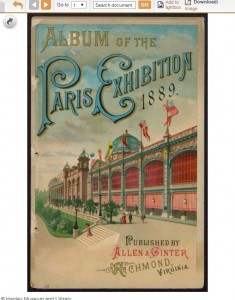Thanks to a request from a student in HCA the Library currently has trial access to World’s Fairs: A Global History of Expositions from Adam Matthew. Through this unique resource you can explore the phenomenon of world’s fairs from the Crystal Palace in 1851 and the proliferation of North American exhibitions, to fairs around the world and twenty-first century expos.

You can access from the E-resources trials page.
Access is available on and off-campus.
Trial access ends 14th February 2020.
World’s Fairs brings together for the first time official records, monographs, personal accounts and ephemera, including publicity, artwork and artifacts, for more than 200 fairs this collection offers a fascinating insight into international expositions.

Album of the Paris Exhibition 1889 [screenshot from World’s Fairs]
The collection is easily searchable and there are also various options that allow you to browse the site by the specific Fair or key exhibits, interactive site plans, images and sound recordings.
You can view the scanned image of the original documents but please note that during the trial PDF download options are not available.
You can access this database via E-resources trials.
Access is available on and off-campus.
Trial access ends 14th February 2020.
Feedback welcome.
Access is only available to current students and staff at University of Edinburgh.
Please note, trial access to a resource is an opportunity for our staff and students to try a resource out and give feedback on its quality and usefulness. However, if we trial a resource this is not an indication that we plan to or will be able to purchase or subscribe to the resource in the near future.
Caroline Stirling – Academic Support Librarian for History, Classics and Archaeology
